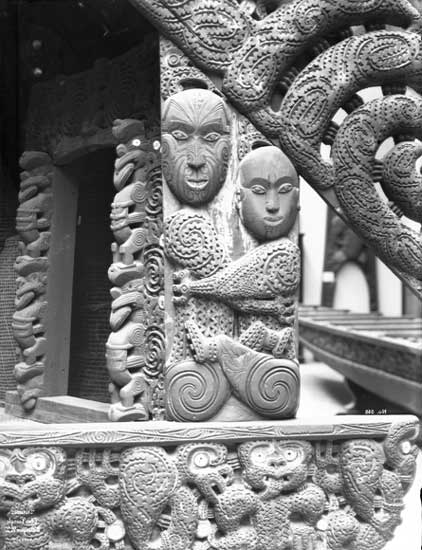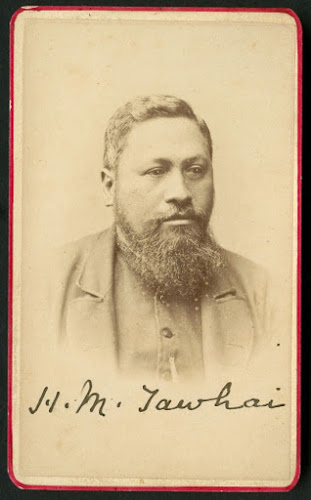South Auckland and the 9 July 1863 Proclamation
On 9 July 1863 a proclamation was issued by the government addressed
to 'the natives of Mangere, Pukaki, Thirmatao [sic - Ihumatao], Te Kirikiri, Patumahoe, Pokeno, and Tuakau', warning that:
All persons of the native race
living in the Manukau district and the Waikato
frontier are hereby required immediately to take the oath of allegiance to Her
Majesty the Queen, and to give up their arms to an officer appointed by
Government for that purpose. Natives who comply with this order will be
protected.
Natives refusing to do so are
hereby warned forthwith to leave the district aforesaid, and retire to Waikato beyond Mangatawhiri.
In case of their not complying
with this order they will be ejected.
 |
| MA 1/1863/186 (Box 835), Archives New Zealand |
On the same date magistrates were despatched to the various
settlements to deliver the notice and demand that Māori take an oath of
allegiance to Queen Victoria or leave. As discussed in The Great War for New Zealand (and also in a 2013 article in the New Zealand Journal of History: ‘Choosing Peace or War: The 1863 Invasion of Waikato’) few took the oath. Many of those
to whom it was read feared they might be forced to fight against their own kin
in the Waikato if they did so. Others read it ‘a positive order to leave’. The
overwhelming response was one of bewilderment.
Tamati Ngapora asked whether the ‘day of harvest’ had
arrived and was told it had. His request for an inquiry into the conduct of the
Tainui tribes was rejected outright. As John Gorst described the scene in his
1864 book The Maori King:
They were Maories and relatives
of Potatau. Underlings of the Native Office were despatched in haste to call
upon them to give up their weapons and take the oath of allegiance to the
Queen, or, in default, to retire beyond Mangatawhiri under pain of ejection.
The first native to whom this cruel decree was made known was Tamati Ngapora,
the uncle of the Maori King, who lived at Mangere, in European fashion,
receiving a large income from letting his lands as grazing grounds to the
neighbouring farmers. After a short silence, Tamati asked — “Is the day of
reaping, then, at hand?” Being told that it was, he observed — “Why has not the
Governor put Waikato on her trial, before
stretching forth the strong hand?” Tamati and the other Mangere natives quite
understood the alternatives. They must submit to what they regarded as an
ignominious test, or lose the whole of their property. And yet, to their honour
be it said, they did not hesitate for a moment.
They all thanked the Pakeha for
this last act of kindness in giving them timely warning of the evil that was to
come upon Waikato, and an opportunity of themselves escaping; but they could
not forget that they were part of Waikato, and they must go and die with their
fathers and friends...All the old people showed the most intense grief at
leaving a place where they had so long lived in peace and happiness, but they
resolutely tore themselves away.
And so hundreds of Māori living at Māngere and elsewhere
gathered up what belongings they could carry and trudged south to join their
relatives in the Waikato. The invasion began three days later. The Tainui
communities of South Auckland saw their lands confiscated, their property
looted or destroyed and their once flourishing economy destroyed almost
literally overnight.
 |
| Vincent O'Malley in conversation with Dave Veart, Mangere Bridge School. 9 June 2017 (Photo: Paul Janman) |
In 1927 the Royal Commission into Confiscated Lands (known
as the Sim Commission) concluded with respect to the Tainui communities of South
Auckland that ‘a grave injustice was done to the Natives in question by forcing
them into the position of rebels, and afterwards confiscating their lands’. Nearly
sixty years later the Waitangi Tribunal reached a similar conclusion in its 1985
Manukau Report.
I spoke about the impact of the Waikato War on Māori in the South Auckland region at a public talk at the Mangere Bridge School last month. Meanwhile, marking the 154th anniversary of these events, a group of people are marching from South Auckland to the Mangatāwhiri River, depositing alternative plaques commemorating this history along the way.



Comments
Post a Comment